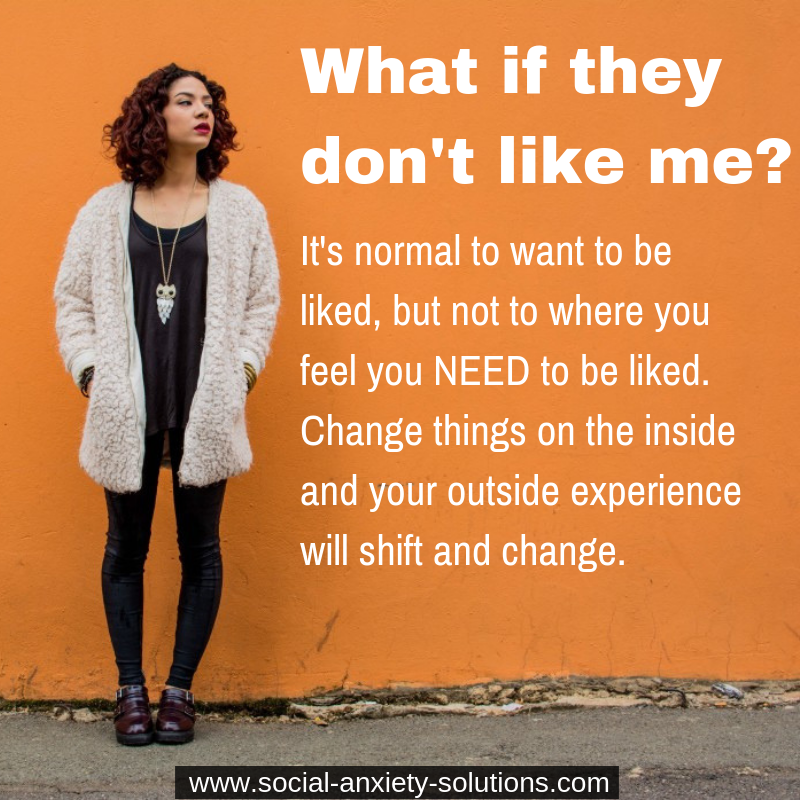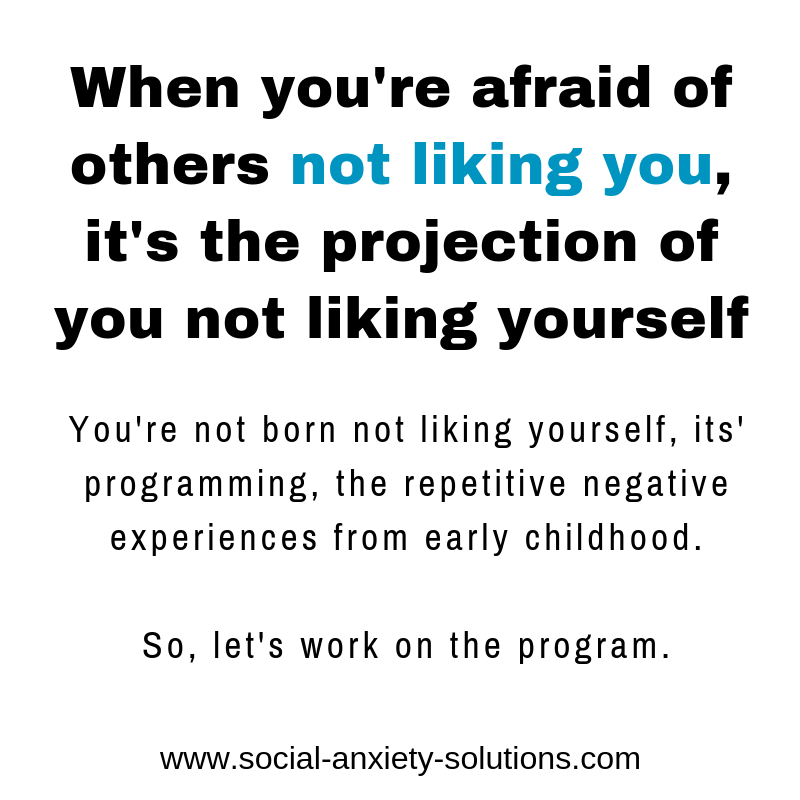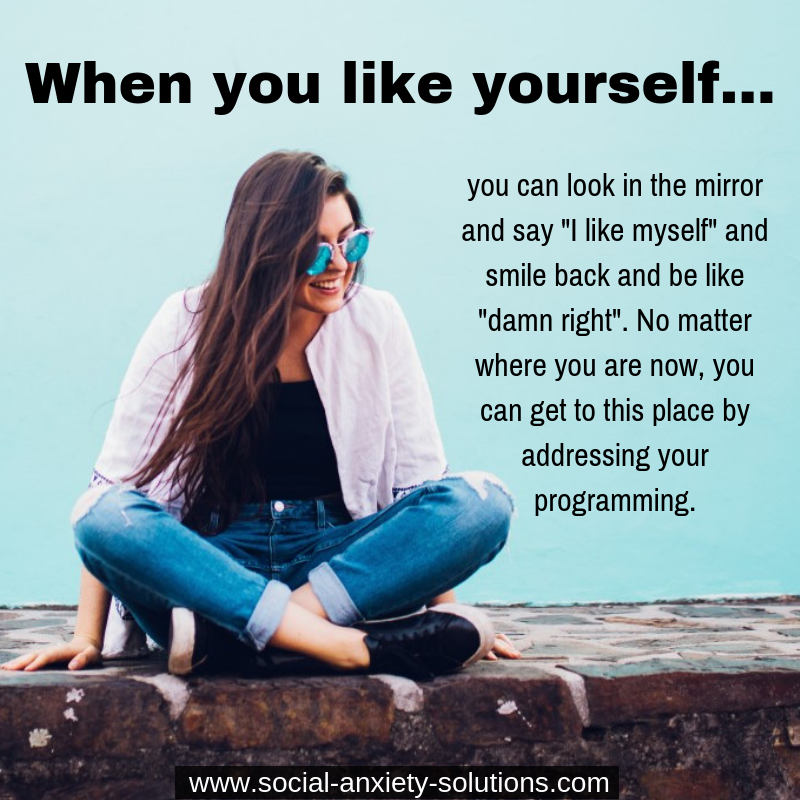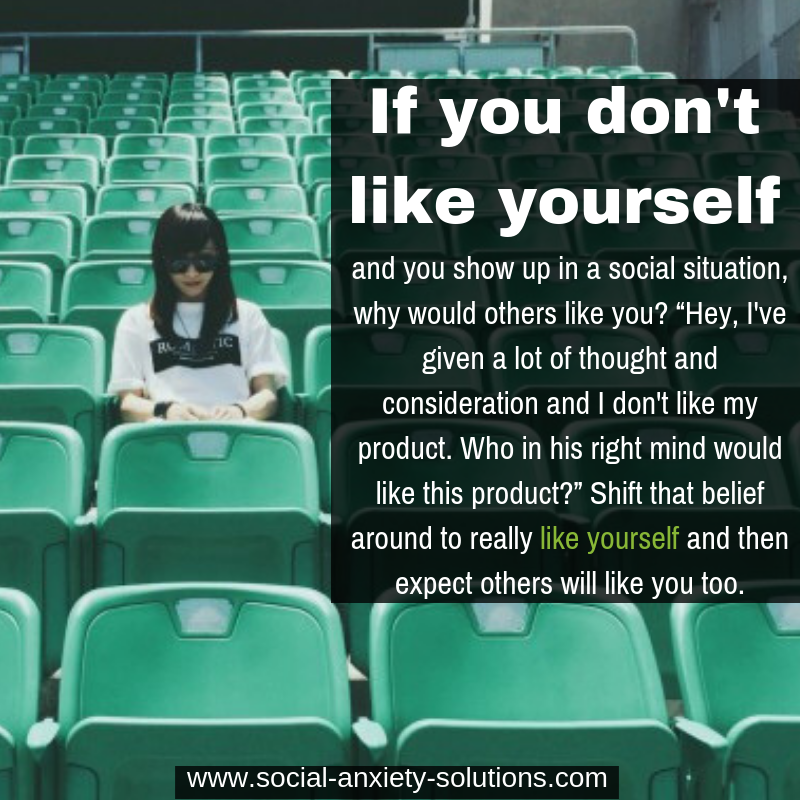SUMMARY
In this post, I’m sharing a common fear people have and its: “What if they don’t like me?”
Go from fearing what others think of you to being okay whether they like you or not. That is the aim and we will cover how to do that here!
Here is more of what we’ll cover:
- An exercise to tune into where you are with the statement “I like myself”
- Why is it that you’re afraid that people don’t like you
- A powerful technique to eliminate the problem
- An exercise to try out the technique
- Consider what energy you are putting out into the world
It hurts to not feel liked and you can get to a safe place where this will no longer affect you.




FULL TRANSCRIPTION
Hi, this is Seb from social-anxiety-solutions.com. I’m a former social anxiety sort of sufferer and I help people with social anxiety feel calm and at ease and relaxed in social situations. So they can have a good time connect and have nice friendships. I release these videos on a weekly basis every Thursday and today I wanted to talk about a common fear that people have and the fear is well… what if people don’t like me?
And it’s a frequent fear. A lot of people have it and it’s its big concern because then when you’re out socially, we eventually dragged yourself or forced yourself to go to this social experience, social event that you don’t want to be at or you’re simply at work or at school and you’re worrying “What if they don’t like me?”
What you’re doing to do is your brain is going to micromanage the way you come across. You’re going to try to come across in a likeable way and do your best to come across in there not come across in an unlikable way. Make sense, right?
Even the people that are not having that problem they do that it’s just in a much more subtle level. We all want to be liked. There’s actually nothing wrong with it to want to be liked. It’s not so good when you feel that you need to be liked and that’s kind of the point of this video.
To make it more clear what the problem really is, when you’re afraid of other people not liking you that is actually a projection onto other people of you not liking yourself.
Where are you with the statement “I like myself”?
When I have this with my clients I have them state out loud “I like myself”. You can do that, just do that say, “I like myself”. And then see how true it feels in a skill 0 to 10. 10 is like yeah that feels totally true and 0 that doesn’t feel true at all good.
Now, say my name is and then say your name. So, if your name is Sebastian like mine is say “My name is Sebastian”. So, say your name out loud “My name is…” Good and now test to see if my name is Sebastian or my name is whatever your name is feels true to the same degree that you say, “I like myself”. Last little test.
By the way this is the Philippines. I just have to show you this. This guy comes passing by drive here out with whatever music that is.
Now I want to say I want you to say out loud “I don’t like myself” and just see how true that feels on the scale of 0 to 10. 10 being very true, 0 being not true at all.
Now likely what you’ll find is man, it’s hard to tell percentages but a fair bit of my clients when they say “I like myself” it feels true to them because they do like themselves consciously because they can come up with good reasons for why they’re likeable.
They’re like intelligent, got a sense of humor, a nice person. Whatever, they have to have reasons for why they like themselves but when they say it “I like myself” it doesn’t feel as true as they say when they state their name because they know without a shadow without that that’s true. And let me say I like myself that doesn’t feel as true as their name because there is a shadow of doubt about whether they are that likable. You come to the other place of course.
The other people, the other section of my client I don’t know exactly what the percentage is when they say I like myself they have trouble saying that because they really don’t like themselves. These are the people that have fair a bit more work to do then the other surprise that people often have is when they say I don’t like myself like wow, yeah, actually feels quite true and then sometimes there are feelings about that.
Some people feel sad about the fact that they don’t like himself or their self and they might feel insecure about it and they might have other feelings about it. They might be frustrated with themselves for not liking this else or whatever. But basically this is just a little test to check in with yourself to what degree am I actually liking myself and are there parts of me that I don’t like.
And people often say as well I like myself but I don’t like myself when I’m in a social situation or I don’t like that I have social anxiety so I don’t like that part of myself or I don’t like it that I blush or I don’t like it that I sweat or I don’t like it that I go blank in social situations or I don’t like it that I lose what to say or I don’t like it that I get all stiff and rigid and that can’t joke around or I don’t like it that I can’t staying connection with someone and have a conversation, I get all in my head or I don’t like it at blah, blah, blah, right?
Their liking of themselves is very conditional which makes a lot of sense because when your social anxiety comes up it robs you of all your social skills you can’t be socializing because your brain is saying hey, get the hell out of here or fight that person or freeze. Your brain is in survival mode in that situation. You can’t you can’t be socializing that’s not you know your brain is not going to be capable of coming up with clever jokes or being remaining present in a conversation. That is all out of the window because of the social anxiety hijacking your brain.
Why am I afraid of people not liking me?
Anyway, so, what the problem is when you’re afraid of other people not liking you for a big part it is the projection of you not liking yourself. Now where does that come from? Well, you guessed it. You’re not born as a little baby not liking yourself. So, what is it? It’s programming, that’s right. It is programming so that means the repetitive negative experiences from early childhood.
Often it is a parent that the child perceived didn’t like them. When you were little did you perceive that your dad didn’t like you that you’ve received your mom didn’t like you and in some cases an influential brother, influential sister or maybe your teacher or maybe there’s a whole history of you experiencing people not liking you. And if so, yeah, I’m sorry to hear that. That is something I can definitely relate to and it can be a lonely business however things can be shifted and turned around when that belief in your brain is going to shift and turn around because when you change things on the inside the things on your outside experience is gonna shift and change because you’re gonna feel different you’re gonna think different you’re gonna behave different you’re gonna have a different vibe, a different energy about you and people are gonna respond differently to that.
The past doesn’t equal the future. That is common saying and that’s very much true. I’m the proof of that. There are tons of people to proof of that you can actually change you know. That’s the very good news.
A technique to eliminate the problem
Now we’ll do a little tap along. I’ll do a bit of tapping on this tapping is that the more common name might be EFT. It stands for emotional freedom techniques. It is the technique that I use to overcome my own social anxieties what I’ve helped hundreds of people with to let go of our social anxiety and feel more socially confident. It’s what I am teaching a bunch of my videos. It’s really weird and wacky but it is amazing, it works. If you don’t believe me go check out comments on these videos and so on.
What that technique is? It’s a psychological form of acupuncture but instead of using needles you tap with tipsy fingers of specific acupressure points in the body. When you do that while you’re focusing on particular issues then the emotions connected to those issues start to release.
Now this is a super simplified explanation of what it does. There’s actually a lot more to it. Now I run an online community social confidence community which is closed for registration at the moment but I’m teaching people over a period of time and we’re now four or five months in how to use tapping and energy psychology to overcome their social anxiety. And we’re four months in and they have only gotten like half of the information in order to free themselves of their social anxiety.
Now they’ve made progress. They feel better they’re less anxious, they get triggered less, they feel calmer, they’re more at ease, they’re having moments where they’re not having anxiety they’re less bothered by their anxiety. All of that good stuff is happening but I’ve taught them a ton and in these videos I’m just giving you a tiny itty little bit.
To come over your social anxiety you learn about your inner psychology how it all works. And like I said I’m just giving you tip it’s here and because this is something I’ve gathered over the years. There’s like 15 plus years that I’ve studied this to see all right well how does this puzzle fit together?
So, you want to learn about your emotions, you want to learn about your thinking, you want to learn about how this tapping really works right but I’m just giving you a little bit here. So, with a little bit of change that you might get as we’re doing this just know it’s just the tip of the iceberg. Like a little bite of the whole meal and I’m saying that so that you can raise your standards because from my perspective as social anxiety is not something that you want to that for sure not something you want to live with for the rest of your life but definitely else enough not something that you have to live with for the rest of your life.
It’s something that you can completely shift and that’s not me that’s not just me saying that. There are tons of people on my podcast as well saying that. People with PhDs, doctors, researchers, psychologists, psychotherapists. And I know that the mainstream thought is that you can only manage it and you can at best reduce it and come to live with it and come to terms with it but that’s not my experience and that’s also not the experience of these kinds of psychologists and psychotherapists that I interviewed because these are the guys that are traditionally trained who have incorporated EFT or energy psychology into their practice and that’s when you get results that the mainstream doesn’t get because we’re not just addressing your thoughts your thinking and your behavior. Now there’s a missing component there.
Social anxiety is mostly an emotional problem and if you just address that on the thinking in the behavioral level yeah, you’re not gonna get that far whereas when you address the emotional side of the problem that’s what you can actually shift it completely and get to a place or where you’re relaxed, you don’t take yourself so damn serious and where you can just be you.
The real you that is hiding behind all this programming, behind all this fear, behind all these worries, behind all these limiting beliefs one of them being “I don’t like myself”. We’re gonna do a little bit of tapping on that.
All right. So, what I want you to do if you’ve never done this simply follow along with me, do what I do, say what I say, and monkey see, monkey do. So, if I’m tapping here, you’re just gonna tap there and here comes our disco man again.
You don’t have to do this perfect. Even if you do it imperfectly it’s still gonna work, alright? If you’re not exactly sure just copy me.
Tap Along Exercise
Alright, good. Let’s go, tapping on the side of your hand. Very good. Okay, just take a deep breath in, close your eyes for a second, take a deep breath in. Breathe out, relax.
Just say “Even though I might not like myself as much as I want to like myself, I want to consider the possibility of liking all of me.
Even though I don’t like old parts of me, there are things that I definitely don’t like about myself and others have shown me why I’m not likable in that area. I’m just not likable.
And I want to try to accept these unhelpful beliefs in my mind even though a part of me is resisting that for whatever reason.
Even though I don’t like myself, that’s how it feels, that’s what resonates as true on some level. I want to try to come to terms with where I’m at”.
Very good. Tapping of the beginning of your eyebrows. Just say “I don’t like myself.
Side of the eyes, “How can I like myself?”
Under the eyes, “I’m such an unlikable person”.
Under the nose, “There’s nothing good about me”.
Chin, “I’m just a worthless piece of shit”. By the way, we’re verbalizing negative things and that might bring up the motion and the tapping will soothe and calm down that emotion.
On the collarbone, “I am the most unlikable person in the world”.
Under the arms, “And if you don’t believe me on”,
On the liver point “I can make a list of people that will say that’s true”.
Wrist point, “It will be a long list”. Top of the head, “I am just unlikable”.
The beginning of the eyebrows, “I don’t want to like myself”.
Side of the eyes, “What’s there to like anyway”.
Under the eyes, “The answer is nothing”.
Under the nose, “Everything about me sucks”.
On the chin, “That’s right. There’s nothing great about me.”
On the collarbone, “I refuse to like myself”.
Under the arms, “I’m not gonna do it”.
Wrist point, “I don’t deserve to like myself”.
Top of the head, “I don’t see myself as a likeable person”.
The beginning of the eyebrows, “It’s not possible that I could be a likeable person”.
Side of the eyes, “Unless it is”.
Under the eyes, “I wonder what it would be like”.
Under the nose, “Wouldn’t it be nice if I was a likeable person?”
Chin, “I’m not”.
Collarbone, “But wouldn’t it be nice if I was one?”
Under the arms, “I wonder how life would be if I felt likeable?”
Liver point, “Because when I like myself”,
Wrist point, “I expect others to like me too”.
Top of the head, “And that would make me feel a lot more safe socially”.
Deep breath. Very good. All right, now, like I said this is just a little taster. A little itty-bitty mini tap along as to what’s possible and I already mentioned it a little bit as we were doing that tapping. The cool thing is like when you like yourself, when you’re really congruent when you look in the mirror and you’re like I like myself and you smile back and you’re like damn right.
However, conceited that may sound this is of essential importance because when you’re okay with yourself, when you like yourself and you’re like “I’m just likeable. Why not? I’m not perfect.” I’ve got lots of flaws and by the way I’m speaking for myself I’m definitely not perfect after that you know as you can see, I’ve got a gazillion flaws but feel like myself. I’m all right with my flaws.
I don’t have to be perfect and it’s taken a long time and a lot of inner work to come to that place because I definitely had the experience where my mom didn’t like myself. I was being placed outside of the house when I was 9 and I was gonna go to a foster home because my mom and I and my stepdad were fighting to such a degree that my mom didn’t see anything likable or nice or friendly about me anymore and I was blamed for all the problems.
Now I’m not to start like a sad sobbing story or anything but I’ve had that experience for a long period of time in my formative years and I hated my step dad. My dad died when he was when I was five, but he was 31 so I’m 34 so at least I outlived him. Get away from me. My stepdad I didn’t like him and he didn’t like me and so I had a long period in my life where I didn’t feel liked and that’s where that program came in for me and that’s stuck with me for the longest time and it’s taken a lot of work for me to unroot that and shift that around and change that in my brain so that doesn’t resonate with me anymore that I’m not likeable and that people don’t like me and that kind of stuff. And I’ve since gathered a lot of evidence to the contrary which is also important.
However, in more cognitive approaches it the idea is to just challenge the thought that you’re not likeable and to then go out and look for evidence that you are likeable but most people like I said earlier they already have a lot of evidence that they are likeable and yet that deeply ingrained “I’m not likeable” belief is still running the show on a subconscious level because there’s a lot of emotion connected to it and the emotion is what needs to be shifted and tapping is a very powerful way to do that.
The energy you put out there
However, it will be a process over time most likely because you are for a long time and you have a lot of emotional evidence to back up that belief that you’re not likable. Even if it’s not on the surface for you because when you get to a place where you’re like “Hey, I like myself” think about it now when you’re in social situations you’re this is a metaphor I give to my clients sometimes, all right. If you don’t like yourself and you show up in a social situation, why would others like you?
You’re basically saying hey I’ve got this product here and yeah, I don’t like it, smells bad, it’s not a great product, who would like it? I definitely don’t but do you maybe like it, would you like it? It’d be amazing if you liked it because you like it then maybe I can like it but I don’t like it and I wouldn’t expect you to like it that would be stupid. I’ve given this a lot of thought and a lot of consideration and I’ve come to the conclusion after these twenty seven years that I’m alive or at least 35 years that I’m alive or how that this product “I don’t like it but can you please like it? Please, please, please? Please accept it? Come to terms with it, say that it’s a great product.
That’s the energy that you’re giving up where as we said when you actually like yourself it’s like “Hey, I’ve got a great product. I’ve given a lot of thought and consideration and I don’t like it. Oh, my God, you should check out this product it’s a great product. I like it and I’m expecting you to like it too. Who in his right mind would like this product?”
See the difference. What kind of a difference in energy does that present to other people? Big difference tells you, big massive difference. Shift that belief around really like yourself and then you know expected others like you too and think about how safe you feel when that’s your experience socially. I like myself. Well, if someone else then doesn’t like you well so what? You like yourself.
If someone doesn’t like me and of course that happens I’m like all right, it’s fine. My assumption would be maybe that person is not really in a good mood, maybe that person has some insecurities about the way I’m coming across and that’s actually what’s mostly going on.
They’re rejecting the part of me that that they’re not accepting within themselves so I’m showing up and I’m all outgoing and loud and they’re judging then so they don’t like me. It’s that they are rejecting the part of them inside of them that is outgoing and loud and so it’s not nothing to take personally.
Anyway, long story. So, I hope that’s been helpful. If it is helpful tell me under this video what you learned from this. Share me your insight not just for me but most…
Yeah, my alarm went off and cut of my video. Anyway, I was at the end of what I wanted to say anyway so, I hope this has been helpful. Now, if this was helpful for you please share with us your insight under this video. Now that is not just for me, that’s also for other people because a lot of people I know can relate to this particular issue and seeing on my online forum community a lot of people find support and seeing that other people have the same issues and they are learning from each other and they are supporting each other.
And I’m not necessarily saying that you need to do that, I don’t need to teach you anything but just sharing your own experience of how you feel with this issue or what you have learned from this will help other people and will make my video more popular. That’s also helpful. It’s going to reach out more people.
I release videos like this every Thursday so subscribe here, here, here or here and check out some of the other videos and definitely if you want to take the things to the next level I have a free social confidence starter kit on my website where I teach you this technique in a lot more detail, the tapping technique that I guided you through. It’s a ten-step video course that is like I said free. And it also has a free eBook called “How to overcome social anxiety completely” where I share my story and how can you get to anxiety free and create a rock-solid social ease or confidence. You can get that by going to my website by clicking bellow this video and signing up there.
All right, I hope to see you there. Yeah, talk to you soon. Bye for now.
If you experience Social Anxiety, click below to receive the FREE “7 Secrets to Social Confidence” Mini Course!
- How To Stop Worrying - January 17, 2024
- How to Reduce Facial Blushing with EFT Tapping? - June 29, 2023
- Are You Scared to Get Anxious? Here’s how to fix it! - June 16, 2023


